A number of handbooks, brochures, tools and materials have been developed to support the implementation of EIP strategies. UNIDO has collaborated with international organizations to provide a common vision for EIPs. For instance, a close cooperation between UNIDO, the World Bank Group and the German Development Cooperation (GIZ) enabled to develop an international framework for eco-industrial parks. This framework provides a common understanding of EIPs and an approach for defining minimum performance requirements for EIPs.
To support the implementation of the International Framework for Eco-Industrial Parks, the objectives of UNIDO’s EIP Toolbox are to:
- Provide a practical set of customized and flexible tools to assist practitioners with the development and implementation of eco-industrial parks and related initiatives;
- Support EIP implementation and decision-making processes in relation to existing and new industrial parks.
Target users and application of the EIP Toolbox
The targeted users of the EIP tools are staff of international development organizations and supporting service providers working on eco-industrial park projects. The EIP Toolbox covers all key components of eco-industrial parks, including Resource Efficient and Cleaner Production (RECP), development of industrial synergies, strengthening park management, park selection and scoping EIP interventions, policy support and capacity building. This toolbox is intended to be applicable to:
- Industrial parks in various international contexts with a core focus on transition and developing countries;
- All development stages of industrial parks (e.g. scoping and concept planning, (pre-) feasibility studies, investment decisions, design and construction, operation, redesign and optimization);
- Industrial parks with different characteristics (e.g. types of industry sectors in park, park size, level of technology development, park management model).
Tools
The Eco-Industrial Parks tools set contains 10 different tools:
1. ASSESSMENT TOOL:
The objective of this tool is to assess an industrial park against the International Framework for Eco-Industrial Parks (UNIDO, WBG and GIZ, 2017) and subsequently identify, prioritize, plan, manage and monitor eco-industrial park initiatives. It can be used and adapted to all types of existing (brownfield) industrial parks and management structures (e.g. private company, public authority, public private set-up, real estate).
2. OPPORTUNITIES MONITORING TOOL:
The objective of this tool is to monitor and report resource savings and impacts from EIP opportunities identified and implemented in industrial parks with the support of (inter)national development projects.
3. POLICY SUPPORT TOOL:
The objective of this tool is to assist international development agencies (e.g. UNIDO) and its national partners with providing technical support to policy makers on EIP policy planning and development. It can be used as a practical tool to inform and guide the project team throughout the different stages of the policy development process in relation to Eco-Industrial Parks (e.g. from high level visioning to implementation, as presented in the main menu of this tool).
4. SELECTION TOOL:
The objective of this tool is to support the selection of industrial parks with a high potential for EIP development and creating successful, visible and replicable EIP projects. It is especially useful to assist in the selection of existing industrial parks that could be transformed in EIPs (brownfield), but it can also be used for the selection of area(s) that will host a new EIP (greenfield).
5. INDUSTRIAL SYMBIOSIS IDENTIFICATION TOOL:
The objective of the tool is to support the identification of industrial symbiosis opportunities (by-product and waste exchanges) between companies. This tool can be used in existing industrial parks (brownfields) to provide stakeholders with an indication of the symbiosis opportunities related to companies operating in the park. Alternatively, the tool can be used for new industrial parks (greenfields) to highlight possible industrial symbiosis between companies locating to the park, and thereby assist in the planning of infrastructures and utilities to enable these connections.
6. RECP MONITORING TOOL:
The objective of this tool is to monitor and report the resource savings and results of RECP assessments undertaken with companies in industrial parks. The tool provides a standardized method to calculate and monitor the economic, environmental and social benefits of RECP opportunities identified and implemented as part of UNIDO's EIP projects.
7. MANAGEMENT SERVICES TOOL:
The objective of this tool is to strengthen and advance the services provided by park management to tenant companies, and thereby increase "value for money" provided by park management to tenant companies and securing / expanding revenues of park management entity. The tool assist industrial park management entities and tenant companies with reviewing, prioritizing, scoping, and action planning of fit-for-purpose and added-value services to their park and tenant companies.
8. CONCEPT PLANNING TOOL:
The objective of this tool is to assist in the sustainable and integrated design and operation of industrial parks from an economic, environmental and community perspective by providing a systemic approach to incorporate demand-driven eco-industrial park opportunities into the concept planning of greenfield parks and brownfield parks.
9. MASTER PLAN EIP REVIEW TOOL:
The objective of this Master Plan EIP Review Tool is to guide the sustainability review of existing Master Plans of industrial parks, based on eco-industrial parks concepts and International Framework for Eco-Industrial Parks (UNIDO, WBG, GIZ), and thereby provide concrete suggestions for strengthening Master Plans.
10. ACCESS TO FINANCE TOOL:
The goal of the Access to Finance Tool is to guide park management entities and tenant companies to identify, review and access available financing options for feasible eco-industrial park initiatives. The tool is built on a carefully researched database of available funding options in specific country contexts, of which this South African version is the pilot. To replicate the tool for other national contexts, please consult the UNIDO EIP Access to Finance Tool Replication Manual: Download the replication manual.
11. GENDER SELF-ASSESSMENT TOOL
The Gender Self-Assessment Tool aims to help park management entities and tenant companies assess, review, and promote gender equality. Developed using internationally recognized methodologies, standards, and tools, it incorporates feedback from participating companies and Eco-Industrial Parks involved in the project. To ensure effective use of the tool, UNIDO GEIPP has provided a preparatory setup and step-by-step guidelines, which we recommend reviewing before proceeding. Download the supporting documents here: Preparatory Setup and Step-by-Step Guidelines.
The tools are available in 6 different languages. Please consult the tables below for the appropriate language versions of the EIP tools and for downloads.
Eco-Industrial Parks Tools
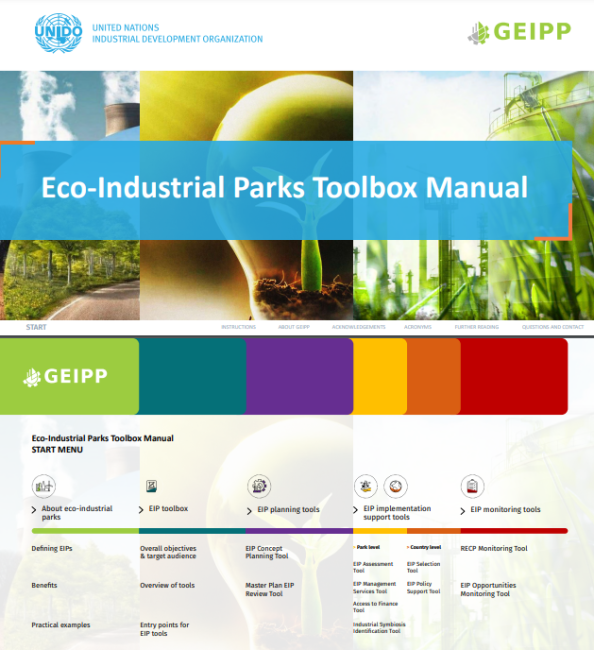
EIP Toolbox Manual
Jul-01-2021
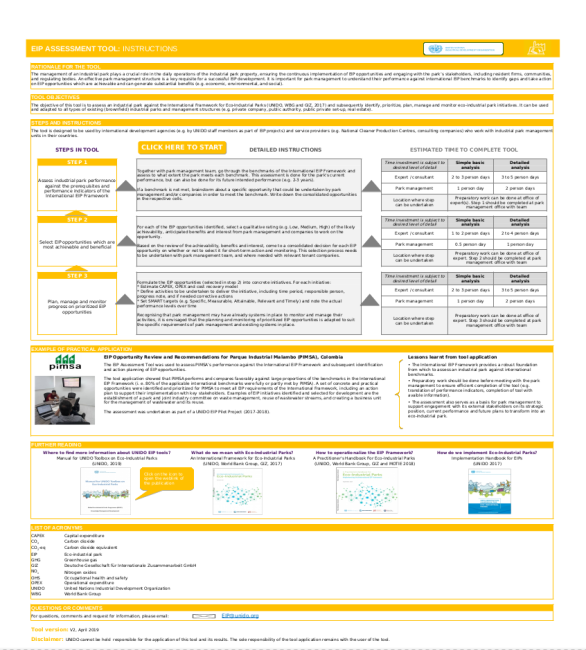
The EIP Tools in English
Jun-30-2021
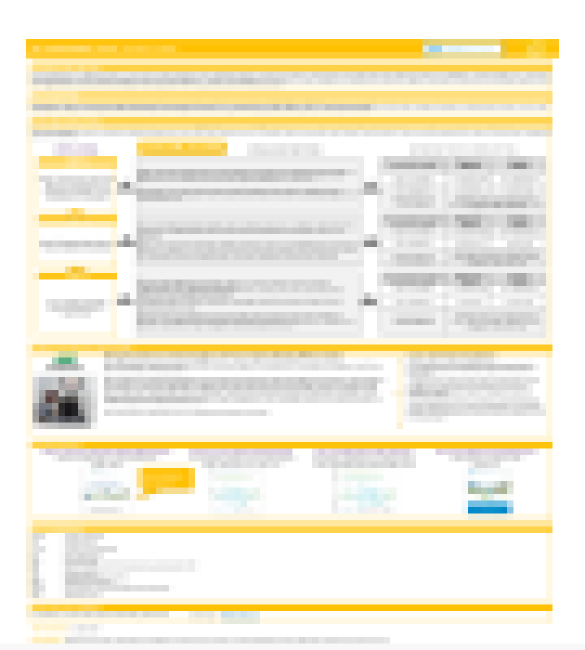
The Eco Industrial Parks Tools in French
Jun-03-2021
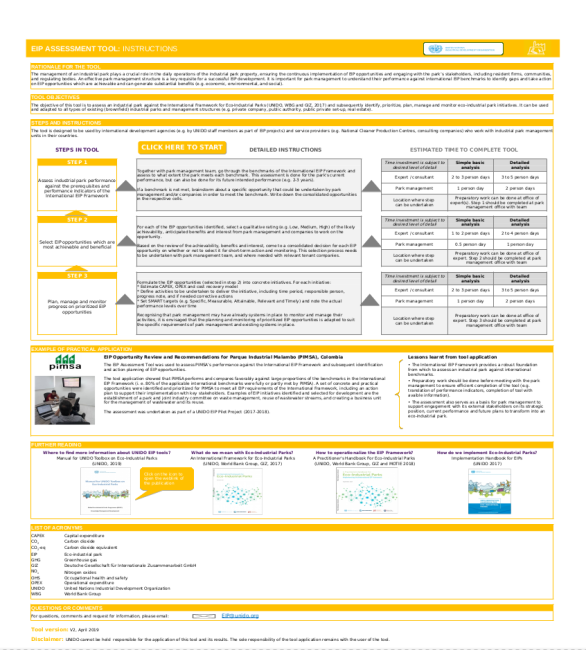
The Eco Industrial Parks Tools in Spanish
Jun-02-2021
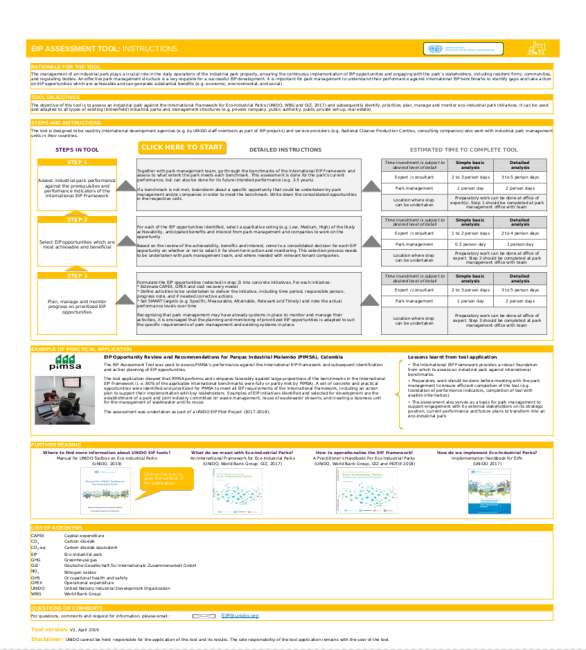
The Eco Industrial Parks Tools in Mandarin Chinese
Jun-01-2021
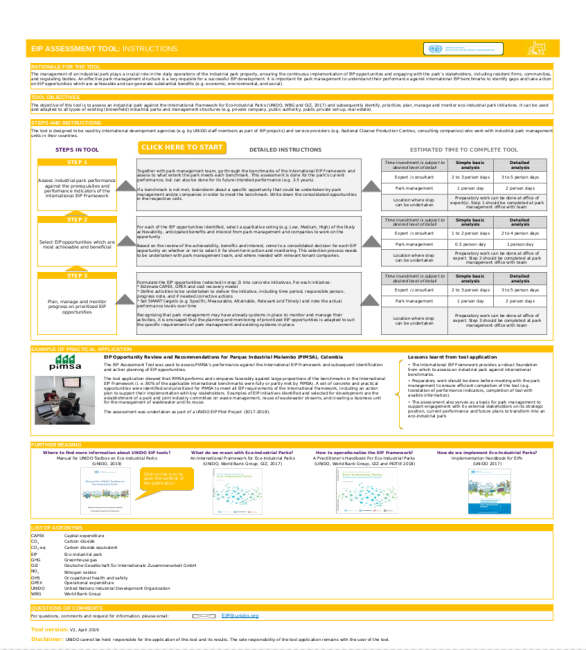
The Eco Industrial Parks Tools in Ukrainian
May-31-2021
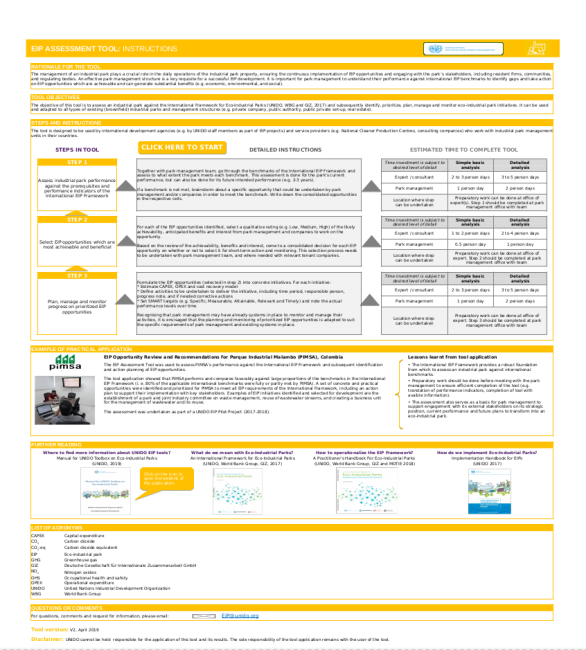
The Eco Industrial Parks Tools in Arabic
May-30-2021
